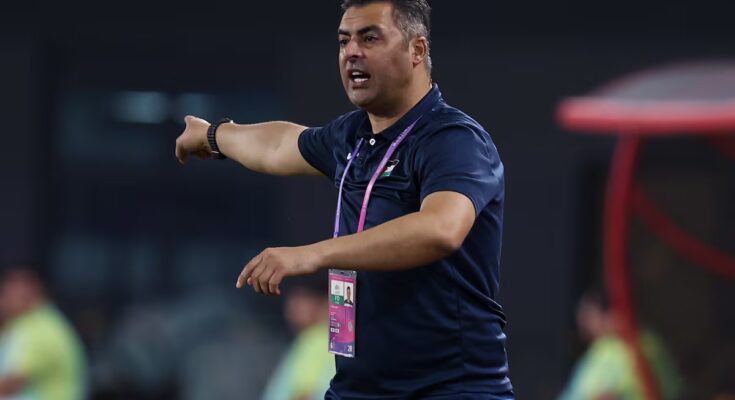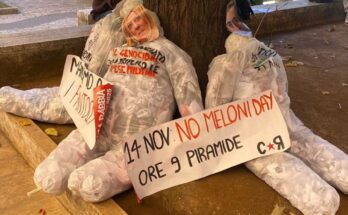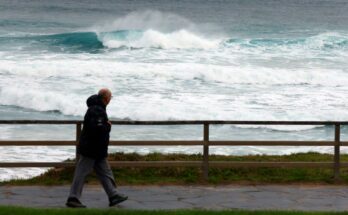Ehab Abu Jazar, 45, grew up between Khan Yunis and the Rafah border crossing, infamous for thousands of humanitarian trucks blocked by the Israeli army. There, in the 1980s, a child learned to dream with a ball at his feet in the arid streets surrounding a house that no longer exists and a few steps away from the desperation of the many refugee camps surrounding the southwestern city of the Gaza Strip. Among the dust and noise of a perpetual conflict, that splintered ball was his universe, his way of imagining a different future, despite war, scarcity and constant fear. That boy is the coach of Palestine today. His story embodies the complex reality of a country in conflict: resilience in the face of the pain of loss and distance, the hope that arises in the midst of destruction and the strength that sport can give to an entire people. Between the memories of the improvised matches in the dusty alleys and the hard days of a war that also took away his father, Ehad learned to transform fear and sadness into motivation, bringing the voice of his people into every training session and match of his national team.
Ask. Who was and who is Ehad Abu Jazar today?
Answer. Like every Palestinian child, I too deeply loved football. I played everywhere: in the alleys, in the school courtyards, in the local clubs… until I managed to become a player for the club and then for the national team. I grew up during the first Intifada, in 1987, when I was just seven years old. Everything around us encouraged us to express our Palestinian identity and football became much more than a game for me. It shaped my character, my life and my path. My first official match with Shabab Rafah remains the most defining moment of my life: it marked the beginning of my professional connection with the game and the fans.
Q. What did it mean to grow up in Palestine in those years?
R. He was an energetic, passionate boy who lived and breathed football. We played in open spaces, on dusty fields, in every corner of Khan Yunis. Most of my family members were athletes—we even had a family team that competed in community tournaments. Since those early days, football has become a family tradition. At Shabab Rafah (the club) there were several talented players from my family, including Suleiman Abu Jazar, who later became president of the club.
When I was little, everything around us encouraged us to express our Palestinian identity and football became much more than a game for me.
Q. Was there a specific moment when you realized that football would be your life?
R. My environment itself guided me: my family, my neighborhood, the culture around us. Football was everywhere; It was our way of expressing identity, unity and resistance. When I played my first match with Shabab Rafah, I realized that it was no longer a hobby: it was my life.
Q. Was football just a game in your childhood?
R. For us football was a form of freedom. It allowed us to escape the restrictions of the occupation and imagine a different and better Palestine. It wasn’t just about winning games, it was about feeling alive and visible in a world that tried to silence us.
Q. Are there any family memories or episodes from your childhood that often come to mind?
R. I always remember my first official match with Shabab Rafah. That day I understood how deeply connected I was to football and to my people. It is the memory that fuels me every time I face difficulties.
Q. Where were you on October 7, 2023, the day of the Hamas terrorist attack that escalated the conflict with Israel?
R. I was at home in Ramallah. I woke up and saw the images appear and honestly, we were terrified. We knew that Israel’s reaction would be extremely violent and inhumane. What is happening in Gaza is genocide in every sense of the word.
Q. Were you able to return home at some point?
R. I have always lived in Palestine. I was born and raised in Gaza and left in 2009 to play with Hilal Al-Quds and Al-Am’ari. Our family home in Gaza, the home we built with love, was completely destroyed during this war. It no longer exists.
Q. How did the events of the war change your relationship with your city, with your family and with the friends who are still there?
R. The war changed everything: the city, the landscape, the streets where we grew up. I maintain constant contact with my family. My mother is still in Gaza and my brothers now live in tents in Khan Yunis. That reality breaks my heart every day.
Q. How do you survive knowing you are safe while others live under bombs?
R. No Palestinian truly feels safe. Even those outside Gaza live in fear and anxiety. Every time I hear about bombings in certain areas, my heart stops, because I know people there: family, friends. In Gaza we are all connected; each explosion feels personal.
Q. During a conflict, the cell phone often marks the thin line between life and death, but it is also the only connection with reality. How did you experience it?
R. Communication was extremely difficult, especially during the first week. We didn’t know if our families were still alive. We followed every news with our hearts in hand. The same day we played Kuwait, my family was ordered to evacuate the neighborhood: I went to that game not knowing if they would survive.
In our case football becomes a mission, not just a sport. Every match, every goal has a meaning that goes beyond the pitch
Q. What do you do to protect your players on the eve of a match?
R. You cannot isolate a Palestinian player from what is happening around him. Instead, let’s try to turn that pain into motivation. But the most difficult moments are when the messages arrive at midnight: they almost always bring bad news. During this war I lost my father; I received the news in the middle of the night. It was devastating.
Q. It is therefore not surprising that he is afraid to open the messages he receives…
R. YES. Especially at night. Messages during war often mean a loss: a death, a bombing, a destruction. Every notification makes your heart stop for a moment.
Q. What does it mean to “be there” for your people even when you are far away, especially at a time when many are losing their homes, families, or lives?
R. We represent the Palestinian people and play on their behalf. I am one of them and I lost my home like many others. We paid a very high price. We also lost great figures of Palestinian football, such as Hani Al-Masdar, my assistant in the Olympic team, and Suleiman Al-Obeid, a legendary player and dear friend who died while looking for food. Their deaths were a personal loss, but also a loss for all of Palestinian sport.
Q. He named Al-Obeid, the “Palestinian Pelé,” who died during the conflict.
R. Suleiman Al-Obeid was one of the brightest names in Palestinian football: a true diamond. He was humble, talented and much loved. Your loss is irreplaceable.
Q. Palestinian football has always had a symbolic role even before a sporting one. What does it represent for your people today? Is it still possible to talk about sport when everything around is destroyed?
R. For us, football is much more than a game. It’s a platform to tell our story, to give our people a reason to smile. In moments when everything is destroyed, football becomes a lifestyle.
Q. The team’s recent results have served to give hope and a moment of normality to the Palestinians.
R. It was an incredible feeling of pride. In dark times, being able to bring even a spark of joy to our people means everything. Seeing how the fans rallied around the team filled us with pride and gratitude.
Q. Palestine was very close to passing the round in the World Cup qualifiers. How much did that injury-time draw against Oman caused by such a controversial penalty hurt?
R. It was painful, of course. We wanted to win and celebrate our people. The penalty decision was dubious, but this is football: victory, defeat and draw are part of the game. What hurt the most was that our people expected joy that never came. But we have shown that Palestine can reach the World Cup and we will fight to be there in 2030.
Palestine’s squad for Euskadi, friends from Catalunya have revealed – and there are players from FIVE confederations on the pitch. Including several first calls.
🔻DETAILS🔻https://t.co/yJ2of2xRtq
— Palestine Football (@FutbolPalestine) November 10, 2025
Q. What did you say to your players in the locker room after that game?
R. I told them they were making Palestine proud. We will move forward, this journey is not over.
Q. During the conflict, the national team became a kind of emotional refuge for its people. Did you feel this responsibility?
R. Absolutely. From the moment I assumed any position, I knew we carried the hopes of an entire nation. It’s a great responsibility, but also a great honor.
Q. What is it like to coach a team that carries the weight of an entire city? What becomes of football in these conditions?
R. Everything changes: football becomes a mission, not just a sport. Every match, every goal has a meaning that goes beyond the pitch. We play not just to win, but to exist.
Q. What is there in the hearts of Palestinians today: more anger or more desire to start again?
R. Both things exist. But above all there is a profound desire to rebuild. We are a people who love life, who learn, read, write and dream and that is why we will rise again.
Q. Are you optimistic about the possibility of the Palestinian people returning to Gaza and do you believe that real coexistence with Israel will one day be possible?
R. I believe we will rebuild Gaza. We are a resilient, cultured, educated and determined nation. But I don’t think Israel really wants coexistence. If that were the case we would already have our independent state and our rights.
Q. Thousands of Spaniards (and not only) took to the streets a few weeks ago in solidarity with Palestine. What did it mean for you and your players to feel that human warmth from so far away?
R. It means everything. We are proud of every free person who stood up for us. Your solidarity gives us strength and hope. We dream of the day when you can visit a free Palestine.
Q. In this sense, what do the friendlies against Euskadi or Catalonia mean?
R. It is a symbolic, historical moment. Playing against Euskadi or Catalonia isn’t just sport: it’s a statement. Seeing the Palestinian flags waving and hearing the fans chanting our name is a message against genocide and occupation.
Q. What is the dream today of that child who grew up in the dusty streets of Khan Yunis?
R. My dream as a man is simple: to live freely in my land, without fears or occupations. As a coach, it means taking Palestine to the World Cup and hearing our anthem on that stage. Football has given me everything and I want to give something back to my people.



